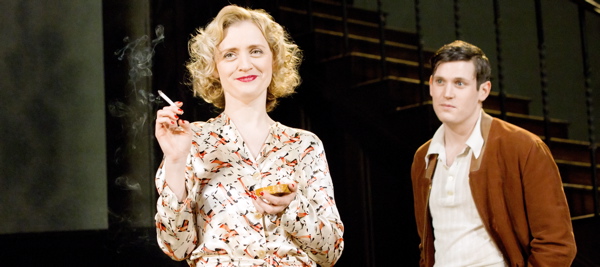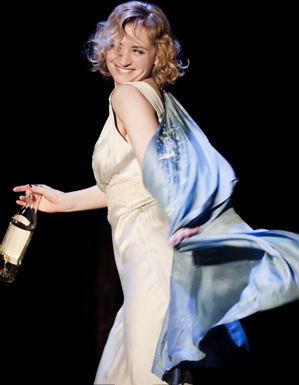By Ray Bennett
LONDON – There have been two first-rate West End productions of lesser-known plays by the late British playwright Terence Rattigan, whose centenary is this year, but the Old Vic comes a cropper with the third, an unconvincing courtroom drama titled “Cause Celébre”.
Written in the mid-1970s, first for BBC Radio and then for the stage, it is set in the mid-1930s and deals with a real life murder case that caused a major scandal at the time. A songwriter named Alma Rattenbury and her teenaged lover, George Wood, were accused of the vicious murder of her 68-year-old third husband.
Rattigan is famous for writing about upper middle-class folk with stiff upper lips – his screenplays included “The Yellow Rolls-Royce” and “The V.I.P.s”– and despite laudable intentions, his characters here are outside his comfort zone.
Thea Sharrock’s staging is outstanding with an unfussy set design by Hildegard Bechtler that switches quickly from drawing room to courtroom and vibrant lighting by Bruno Poet that rivets characters in single lights and isolates characters hauntingly.
Reportedly tempted to write about the murder case for several decades, Rattigan finally got around to it and uses the device of comparing the accused with a fictional woman who becomes forewoman of the jury.
The contrast, however, appears artificial and the result is stilted in spite of the calibre of the players. Alma is written as a giddy slattern and Anne-Marie Duff (“Nowhere Boy”) plays her that way but the woman’s gaiety seems forced instead of vivacious. When young George comes looking for a job, Alma’s loyal but knowing maid (Jenny Galloway) sniffs trouble immediately.
Not only is George a strapping lad for his age, he is unpersuasively sexual. Perhaps the real boy really was, but Tommy McDonnell plays him as wooden and unappealingly thick. Prone to hysteria with a taste for hard liquor, Alma has buried one husband, divorced a second and now tolerates her ageing spouse (Oliver Coopersmith).
She’s sentimental when he’s needy but devious when she requires funds for her outings with George. On stage, it is scarcely credible that this particular woman would become so infatuated with this particular boy that over several months they would, as entered into the court record, engage in 314 acts of congress.
Edith Davenport (Niamh Cusack), on the other hand, is in the middle of a custody battle over her distant son Tony (Freddie Fox) with her estranged husband (Simon Chandler), who has admitted having affairs. Her insouciant best friend Stella (Lucy Robinson) remarks that five affairs over many years does not make him Bluebeard, notes that Edith began having headaches not long into their marriage.
When the headlines splash the murder all over the front pages, Edith joins the general condemnation of Alma and agrees with the consensus that a wicked woman had led a boy astray. Despite her declaration that she is absolutely prejudiced against the accused, she is made forewoman of the jury, which serves the playwright’s purpose in contrast but is not exactly credible. She comes gradually to understand Rattigan’s point that in a relationship whoever is the most adored holds all the power, but the revelation is not as moving as the playwright surely intends it to be.
Rattigan is much more sure-handed with the solicitors and barristers, all shrewd and clubbable, with Nicholas Jones cannily appealing as the main defense counsel. It’s no surprise than in 1930s England, it was the working-class kid who took the brunt of the blame and Rattigan acknowledges that in Stella’s comment that Alma’s affair was with a servant … “that’s the real horror!”
Venue: The Old Vic, London (running through June 11) Cast: Anne-Marie Duff, Niamh Cusack, Tommy McDonnell, Nicholas Jones, Lucy Robinson, Freddie Fox, Simon Chandler, Patrick Godfrey, Jenny Galloway, Oliver Coopersmith; Playwright: Terence Rattigan; Director: Thea Sharrock; Set designer: Hildegard Bechtler; Lighting designer: Bruno Poet; Music: Adrian Johnston; Sound designer: Ian Dickinson for Autograph
This review appeared in The Hollywood Reporter
Photos by Johan Persson


